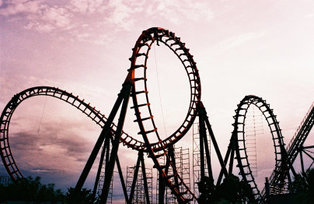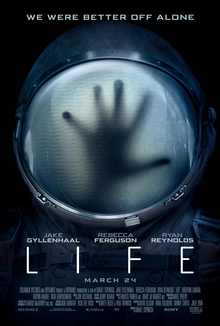SPOILERS: Alien: Covenant, Life, Get Out
Roller Coasters
Horror movies are like roller coasters. Earth shattering revelation, yes I know. Hear me out though, because there’s a key similarity film makers seem to be missing these days. Both have a mounting tension that lasts for about half the experience. Everything after the initial drop is a series of twists and turns that thrill and in some cases nauseate. Then at the end, the audience coasts in exactly where they left. They have returned to safe normalcy. The world is the same, but they are changed in knowing what they’ve been through, and can overcome.
That last bit is what horror directors are screwing up, and yes I’m stating my opinion as if it’s fact. Fight me.
There’s a reason that roller coasters don’t end with a guy in a clown wig shouting racist jokes. It would kill the buzz that comes from returning to normalcy after a trial, and that feeling is just as important as the ride itself. Yes, in real life, there often is a metaphorical racist clown at the end of a difficult journey, but that’s not why I go on roller coasters or watch horror movies. If I wanted to be reminded that sometimes the good guys lose and things turn out for the worst, I’d stay in reality thank you very much.
That last bit is what horror directors are screwing up, and yes I’m stating my opinion as if it’s fact. Fight me.
There’s a reason that roller coasters don’t end with a guy in a clown wig shouting racist jokes. It would kill the buzz that comes from returning to normalcy after a trial, and that feeling is just as important as the ride itself. Yes, in real life, there often is a metaphorical racist clown at the end of a difficult journey, but that’s not why I go on roller coasters or watch horror movies. If I wanted to be reminded that sometimes the good guys lose and things turn out for the worst, I’d stay in reality thank you very much.
This rant comes just after seeing Alien: Covenant and way after seeing Life. Both felt compelled to throw a ‘twist’ in at the end, and neither are as smart as they think they are. As a point of comparison, I’m going to talk a little about a movie that is as smart as it thinks it is, Get Out. This argument hinges on one main idea, that ‘disappointment’ or ‘bummer’ is not a strong emotion to end your movie on.
Alien: Covenant
In the third act of Alien: Covenant, good android Walter is fighting comically evil android David. Walter is the better model and winning the fight. Just as Walter is about to land the crushing blow, we see David grab a knife lying on the ground. Then we cut away, leaving the audience to wonder who won the fight. Except we know who won the fight, because we aren’t stupid, and the movie is going to make us wait another twenty minutes to tell us what we already know. The movie ends with our heroin, Daniels, screaming at David, only realizing once she’s trapped in her hyper-sleep pod that the android she was paling around with is the evil one.
This didn’t add anything to the movie. In fact, it detracts from the final action scene as the audience spends the entire time wondering when the ‘reveal’ will happen. There was no clever ‘gotcha!’ because, we the audience, again, are not idiots. I’m not sure what the emotional payoff was supposed to be, but all we’re left with is a ‘Well fuck, we all saw that coming a mile away. Bummer.’
This didn’t add anything to the movie. In fact, it detracts from the final action scene as the audience spends the entire time wondering when the ‘reveal’ will happen. There was no clever ‘gotcha!’ because, we the audience, again, are not idiots. I’m not sure what the emotional payoff was supposed to be, but all we’re left with is a ‘Well fuck, we all saw that coming a mile away. Bummer.’
Life
| In the final minutes of Life, our heroes make their daring escape from the International Space Station. One character makes a fitting sacrifice to take the evil alien with him into the depths of space in an escape pod, while the other escapes to the surface of Earth. The plan seems to have worked! We watch the pods go their separate ways, one into blackness, the other crashing into the ocean. Except, what’s this? The camera is taking a really long time to reveal who’s in the safe pod. Surprise, it’s the guy who made a willing sacrifice to save all of humankind, and he’s brought the alien down with him! And here’s a shot of the other one, screaming in terror as she goes to die alone in the void. This was less treating the audience like idiots and more like bullying. The filmmakers gave us a really nice ice cream cone, then immediately took it away to watch us pout. Again, not a profound emotion. We’re just left with a feeling of ‘Well that’s a bummer. I really would have liked that ice cream’. |
Get Out
Get Out ends with our hero killing a bunch of psycho racists on his way to freedom. The last racist to die is the ex-girlfriend who lured him to her family home to get his body snatched (it’s a trippy movie). To paint the picture here, in a movie about racism, a black man strangles a white woman to death in the middle of the street, and then blue and red flashing lights appear as a cop car rolls up. We all live in the world. We know how this looks. After all he’s survived, our hero is going to jail.
Bummer. The audience feels a downer ending coming up.
Except it’s not a cop that steps out of the car. It’s our hero’s friend, the comic relief, there to rescue him! The director takes our expectation of a downer ending, and turns it on its head to give the audience an even more satisfying emotional high, because here’s the thing: That’s what we wanted all along.
Audiences aren’t stupid. We see the downer ending coming. Once we know it’s on its way, we’ll spend the entire time up until the end credits waiting for the filmmakers to prove us wrong. If your story doesn’t capitalize on that, you’ll just have a bunch of wasted potential emotional energy.
Bummer. The audience feels a downer ending coming up.
Except it’s not a cop that steps out of the car. It’s our hero’s friend, the comic relief, there to rescue him! The director takes our expectation of a downer ending, and turns it on its head to give the audience an even more satisfying emotional high, because here’s the thing: That’s what we wanted all along.
Audiences aren’t stupid. We see the downer ending coming. Once we know it’s on its way, we’ll spend the entire time up until the end credits waiting for the filmmakers to prove us wrong. If your story doesn’t capitalize on that, you’ll just have a bunch of wasted potential emotional energy.
Final Thoughts
This is all reflective of my personal view on the horror genre. I love good horror, and I was really enjoying Alien: Covenant and Life up until the racist clown popped up in their endings. Good horror isn’t about torturing your protagonists, or racking up the highest body count. First, it’s about using storytelling techniques to take your audience on an emotional roller coaster. Second, and I think more importantly, horror movies are about hope, and rewarding that hope.
Horror movies do what standard adventure movies do, only better. In action adventure movies, our heroes face overwhelming odds and trials, fight monsters, save the day, and come out on the other side having learned something about themselves or the world. Horror movies do the same thing, except our hero isn’t a space wizard or gun toting archaeologist. They’re usually a lot like us except in space, or in the woods. On top of that, the monsters they face are far darker and more disturbing than a dragon or transforming robot. To fight those monsters, they’re never granted a magic ring or superpowers, they have to make do with what they’ve got.
And then they survive.
That’s what people really want out of a horror movie. Proof that even untrained, ill equipped, and against the worst horrors we could imagine, humankind can still come out alive on the other side. To trade the emotional high that comes with affirming that for a ‘gotcha’ moment that will always land with a disappointed shrug, just seems like a waste to me.
Or maybe you just wanna watch a bunch of teenagers take a machete to the face, in which case, to each their own.
See you next time,
Harry L-B
Horror movies do what standard adventure movies do, only better. In action adventure movies, our heroes face overwhelming odds and trials, fight monsters, save the day, and come out on the other side having learned something about themselves or the world. Horror movies do the same thing, except our hero isn’t a space wizard or gun toting archaeologist. They’re usually a lot like us except in space, or in the woods. On top of that, the monsters they face are far darker and more disturbing than a dragon or transforming robot. To fight those monsters, they’re never granted a magic ring or superpowers, they have to make do with what they’ve got.
And then they survive.
That’s what people really want out of a horror movie. Proof that even untrained, ill equipped, and against the worst horrors we could imagine, humankind can still come out alive on the other side. To trade the emotional high that comes with affirming that for a ‘gotcha’ moment that will always land with a disappointed shrug, just seems like a waste to me.
Or maybe you just wanna watch a bunch of teenagers take a machete to the face, in which case, to each their own.
See you next time,
Harry L-B
Disagree? See a typo? Trapped in a basement and the kidnapper left the internet on and this is the only website available? Leave a comment!




 RSS Feed
RSS Feed
